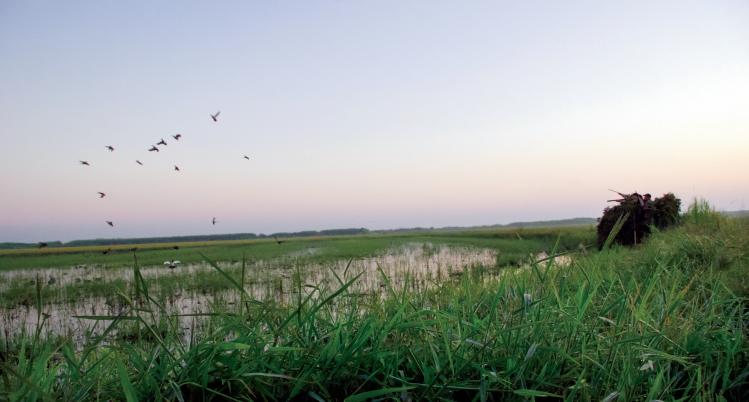Home > Arkansas > Arkansas Environment > Flooded Arkansas Rice Fields Attract Migrating Ducks in Winter
Flooded Arkansas Rice Fields Attract Migrating Ducks in Winter

Rice and ducks have a natural relationship in Arkansas, and in the city of Stuttgart the two combine to create a robust economy. While rice is the major employer, ducks are the major attraction, generating an estimated $1 million for the Stuttgart economy during the 60-day hunting season.
When harvest finishes in the autumn, rice farmers close the drainage outlets in their fields to hold water on the land during the winter months. The water prevents erosion, controls weeds and protects soil nutrients for the next year’s rice crop. The flooded fields and the area’s natural wetlands also provide the perfect resting and foraging habitat for North America’s migrating ducks.
Starting at the age 8, George Dunklin made some of his favorite memories duck hunting in the flooded rice fields with his father.
“Dad took the time to teach me about importance of stewardship and conservation,” says Dunklin, who is a lifelong conservationist and now the first vice president of Ducks Unlimited. Dunklin still farms rice on land his family first began planting in 1907. “We’re in the rice farming and the hunting business and both are conservation businesses,” he says.
Dunklin has tied creation of waterfowl habitats and water conservation into his rice farming business.
“This area where we are, Stuttgart, is the largest area in the world for wintering mallards,” Dunklin says. Stuttgart’s location in the Mississippi Flyway is used by ducks to migrate from Canada south for the winter, and the leftover rice from the harvest provides plentiful food for the birds.
Dunklin says the conservation efforts of rice farmers have played a key role in protecting the waterfowl population.
“As we’ve drained a high percentage of wetlands over the past 100 years for development, rice fields have been a replacement for that lost habitat,” he says. “Rice fields have a very positive influence on the population of waterfowl in the fact that the ducks return to the breeding ground in much better condition.”



